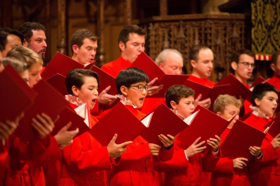Review: Deck the Halls with Handel's MESSIAH at Saint Thomas's in New York

and Boys. Photo: Ira Lippke
Nothing says "Christmas in New York" like a performance of Handel's great sacred oratorio MESSIAH--okay, for some it's the windows at one of the big department stores--with some outings decidedly religious, like this week's pair of wonderful performances at Saint Thomas Church Fifth Avenue, while others are a bit more secular, such as the New York Philharmonic's take at David Geffen Hall. Featuring the Saint Thomas Choir of Men and Boys, with the New York Baroque Incorporated ensemble and some terrific soloists under conductor Daniel Hyde (Saint Thomas's organist and music director), it was a grand start to the season.
The work had its premiere in 1742 in Dublin, where Handel moved in search of new and less jaded audiences than the Londoners that had begun taking him for granted, and he wasn't disappointed by the reception he received. It's believed that his change from concentrating on operas to composing oratorios was the result of his nine-month sojourn in the Irish capital. And while there was some controversy surrounding the work--mostly from the performance of a religious work in theatres--audiences and church-goers took to it with delight.
Saint Thomas's is a spectacular place to hear the work, with its French High Gothic style, stained-glass windows and the gorgeous stonework of the reredos [the decorated wall behind the altar]--one of the largest in the world. Then there's the quality of its sound, which was particularly fine for showing off the voices of its choir, for which the church is famous. The oratorio's most familiar section, the "Hallelujah" chorus, burst forward at the end of the second part, which concentrates on the Passion, with the audience rising quickly, as is the tradition with a joyousness not always heard.
Sometimes performances of the oratorio can drag, but not at this effort (heard Tuesday, December 5), with its brisk tempi and engaged musicians. Of the soloists, I particularly enjoyed the work of soprano Ellie Dehn, with her silvery voice, baritone Jesse Blumberg's dynamic readings and tenor Lawrence Jones's light-voiced lyricism, though mezzo Clare McNamara seemed a size or so too small.
While it's undoubtable that the soloists are important here, the chorus is key to the success of any MESSIAH and, here, the clarity of the runs and fugues was a delight to hear. These concerts in the church have that "special something" with the addition of the boys choir from its Choir School for grades three through eight (some so small, they could barely hold up their scores). The purity of the boys' voices floated throughout the sactuary, giving an ethereal quality to the piece and a total contrast to the full-bodied voices of the men behind them.
Reader Reviews
Videos

